- Home
- Victor Hugo
Les Miserables Page 3
Les Miserables Read online
Page 3
To climb the wall with Cosette, I needed a rope. But where could I get one quickly? Then I remembered. The streetlamp! Each streetlamp in Paris was raised and lowered by a rope. Without another word, I raced to the streetlamp at the end of the alley, took the coil of rope, and hurried back to Cosette.
There was no time to lose. I took off my scarf and looped one end under Cosette's arms. I tied the other end to my rope. Then I took off my shoes and socks and threw them over the wall. I was on top of the wall in half a minute.
Cosette stared up at me, amazed. She was frozen into silence by the thought of Madame Thenardier.
I pulled Cosette to the top and put her on my back. I held both her hands in one of mine. Then I crawled on my stomach along the top of the wall.
We came to the roof of a small building. I slid onto the roof without letting go of the wall. Javert was running down the lane, shouting, "Search the dead end! He won't escape me this time!"
The police raced to the end of the lane. I let go and coasted down the roof with Cosette still on my back. A tree stopped us from dropping to the ground.
We climbed down. We were in the garden of a convent. An old gardener was bent over his roses.
"Here's a hundred francs," I said. "Please let us stay the night."
The moonlight shone on my face.
"Why, it's you, Monsieur Madeleine!" exclaimed the gardener. "Don't you remember me?"
It was Fauchelevent! The man I had rescued from under the horsecart years before.
Meeting Marius
I had saved Fauchelevent once. Now he saved me. He said I was his brother. The nuns gave me a job as his helper.
Javert spent months looking for me. But he never searched the convent. In time, he gave up looking.
Cosette joined the convent school and lived with the other girls. I visited her each day. We spent many peaceful years together this way.
I would have been happy if Cosette had wanted to become a nun. I was safe in the convent and could live out my life in peace behind its walls.
But Cosette needed to see the outside world. When she finished school, we moved back into the city.
I bought a house near a public garden. Every day we walked along the same path. Every day we sat on the same bench.
One day I noticed a young man in the garden. He was handsome, with black hair. His clothes were shabby. I guessed he was a student.
From then on, he was always in the garden when we were. We passed one another each day but never spoke.
The next year, the young man began to change. He dressed better. He sat on a bench closer to ours. He gazed shyly at Cosette.
When I saw Cosette return his gaze, I was upset. She was interested in him also!
I wanted my life with Cosette to go on forever. She was the only happiness I had ever known. I moved us to a new house. The walks in the garden stopped.
Cosette never said a word about the move. She missed our walks. And, I knew, she missed the young man. There was a kind of sadness in her now. Our life together was not as it once was.
But one day things changed. The young man, who had been out of our lives for months, came back.
I was standing outside the church one winter morning. A girl handed me a note from her father, "P. Fabantou."
Fabantou was an actor out of work. He asked me for money. He also asked me to come to his home. He wanted me to see how far he'd fallen.
I knew the address. It was the same building Cosette and I had lived in years ago! I said I would be there that afternoon.
I was nervous. Cosette and I had run from that old building with Javert on our heels. I never wanted to see that place again. But I had given my word.
The building was in even worse shape than before. It was hard to believe that people could live in it. But the streets of Paris are full of people without homes. Many of them would think it was a palace.
I tapped on Fabantou's door. It was opened by a small, bony man. He had the sharp stare of a weasel. Where had I seen his face before?
"Please come in, my dear sir!" he said, bowing low. "Please enter, with your charming young lady."
Cosette and I entered.
I found out later that Marius, the young man from the garden, lived next door. At that moment, he was peering at us through a hole in the wall. He knew things about Fabantou that I was yet to learn.
No doubt Marius was shocked to see us. But here we were--the old gentleman and the girl he lost months ago. There she was before his eyes!
The room was like a cave--dark and cold. A window was broken and an icy breeze blew in. There was no fire in the fireplace.
Fabantou's wife was in bed with a cold. A girl sat on the floor by the bed. Her wrist was bleeding. It was wrapped in a piece of torn shirt.
These were truly les miserables--the outcasts, the underdogs. They were as I had been during my prison days. We were people that life destroyed.
"Here are blankets and woolen stockings," I said. I put a bundle on the table.
Fabantou asked me how he had signed his letter.
"It was signed 'Fabantou, the dramatic artist,'" I replied.
Only later did I learn that this wicked man used many different names. He wrote letters asking for money. He had a different story to go with each name.
"You see how we live, monsieur," said Fabantou. He swept an arm around the room as he spoke.
"The only rag of clothing I own is this torn shirt of my wife's. I can't go out to look for work because I have no coat. I owe a whole year's rent. Sixty francs! And it's due tomorrow!"
I pulled off my brown overcoat and laid it across the back of a broken chair. I gave him five francs.
"That's all the money I have on me," I said. "But I will be back at six with sixty francs for your rent."
Cosette and I left. We did not know that Marius ran after us. Our buggy had taken off before he reached the street.
Marius didn't have money for a buggy. He stood in the street and watched the girl he loved get away once more.
And Fabantou? I didn't know it then. Fabantou was setting a trap for me. I would walk freely into that trap, but barely escape with my life.
Trapped!
I was back at six o'clock with the money. Cosette was safe at home.
Fabantou greeted me wearing my overcoat and smiling meekly. I put eighty francs on the table.
"For your rent and other immediate needs, Monsieur Fabantou," I said. "We will talk about what else you need."
"May God reward you, most generous sir," said Fabantou. He snatched the money off the table.
I sat down. "How is the hurt child?" I asked.
"Not well," replied Fabantou. "She's in great pain. Her sister took her to the hospital."
"Madame Fabantou seems much better," I said, looking her way.
She was standing at the door with her arms crossed. She looked as if she would not let me leave if I wanted to.
"Oh, she's very sick," said Fabantou. "But you'd never know it. She's so brave. She's more than a woman--she's an ox."
Madame Fabantou was pleased by her husband's words.
"You always say the nicest things to me, Monsieur Jondrette." She smiled a shy smile.
"Jondrette?" I said. "I thought your name was Fabantou."
"It's both," said Fabantou, quickly. "Jondrette is my stage name."
I was beginning to see that things were not as they seemed. Then I noticed two men in the shadows.
"Who are those men?" I asked.
"Pay no attention to them," said Fabantou. "They're just neighbors."
"As I was about to say, my most noble patron," continued Fabantou. "I have a picture for sale."
There was a sound at the door. Two more men came into the room. They sat on the bed. The men's faces were covered in soot.
"Don't worry about them," said Fabantou. "They're furnacemen. They have dirty faces because they do dirty work. As I was saying, I want to show you a valuable picture."
Fabantou
turned around a picture that had been facing the wall. Light from the candle shone on it.
"What on earth is it?" I asked.
The men were watching me. I was uneasy.
"This is a masterpiece, my dear sir," replied Fabantou. "I cherish this picture as much as my own daughters. But sad to say, I am forced to sell it. What do you think it's worth?"
"It's an old inn sign," I said. "It's worth about three francs."
The paint was chipped and peeling, but I knew the sign. I could still make out THE SERGEANT OF WATERLOO in faint letters. Underneath the letters was a picture of a soldier carrying another soldier on his back.
It was hard to believe the man before me could be the innkeeper--the man called Thenardier.
"I will accept a thousand francs for this sign," he said.
I was caught in a trap. Escape wouldn't be easy.
"I won't accept one franc less. I hope you have your wallet on you."
The man grinned wickedly.
I rose from my chair and stood with my back to the wall. I looked around the room.
Thenardier stood near the window with two of the four men. His wife stood near the door with the other two. The trap was a tight one.
Suddenly Thenardier jumped at me. His eyes were blazing with anger. His fists were clenched.
"Don't you know me?" he screamed. "Don't you recognize me?"
"No," I replied calmly.
Just then the door swung open. Three more men entered, wearing black masks. One carried a heavy stick. The other had a butcher's axe.
"Is everything ready?" Thenardier asked them.
"Yes," said one of the men.
Thenardier came close, then thrust his face into mine.
"Don't you recognize me? My name isn't Fabantou or Jondrette. My name is Thenardier. Recognize me now?"
"No more than before," I replied. My eyes gave nothing away. I needed to buy time.
"Your goose is cooked, my noble patron!" Thenardier spat out the words. "You're spitted and roasted, my fine bird!"
He started to pace the room.
"You don't know me, eh?" he said. "It wasn't you who came to my inn in Montfermeil ten years ago and took Fantine's brat from me? So you don't know me! Well, I know you, all right.
"I knew you the minute you shoved your noble face inside my door," he raged. "You'll not get away from me, my generous millionaire.
"It isn't smart to take a man's servant," he continued. "I'll teach you not to threaten me with a heavy stick. You were the strong one that day. Today it's my turn. I hold the cards now. And you're done for, my beauty!"
Thenardier stopped. He was out of breath.
"I don't know what you're talking about," I said. "I'm a poor man. I don't know you. You're confusing me with someone else."
"Have you anything to say before we go to work on you?" he replied.
I said nothing. What was the point?
The big man with the axe took his mask off. "If there's any chopping to be done, I'm your man!" he said.
Thenardier shouted at the man for showing his face. In that instant, I ran for the window.
I was nearly out, but three men lunged at me. Six hands pulled me back inside.
I knocked down two of the men. But two more took their place. I was buried under a flood of fists.
"Don't hurt him!" shouted Thenardier. "I want to talk to this gentleman."
I was shoved into a chair.
"I find it strange," began Thenardier. "You haven't shouted for help once. Not even with the window open. I wonder. Are you as afraid of calling down the law as we are?"
I said nothing.
"We can help each other," continued Thenardier. "I'm not a bloodsucker. All I want is two hundred thousand francs. You don't have it with you. But you can write your daughter for it."
He turned to get paper and pen. I lunged for the fireplace and grabbed the red-hot poker. I faced the room.
"You're a poor lot," I cried. "My own life is not worth much. You can do what you want with me. Look!"
I pulled up my left sleeve. I pressed the poker to my bare skin. There was a hiss of burning flesh.
"Poor fools," I said. "I don't fear you." I threw the poker through the open window.
"Do what you like with me," I said.
"Slit his throat!" cried one man.
Thenardier liked the idea. He picked up a knife from the table and started toward me.
Escape to Rue Plumet
Thenardier was almost upon me when suddenly his wife cried out, "Look at this!"
She handed him a balled-up piece of paper.
"How did this get here?" asked Thenardier.
"Through the open window," replied his wife.
"That's right," said one of the men. "I saw it go by."
Thenardier unfolded the note. He read it by candlelight.
"It's Eponine's handwriting, by God!" he exclaimed. "Our daughter writes, 'The police are here!' We better clear out! We'll leave the mouse in its trap."
But the mouse had dashed. I slipped through the window while everyone was busy with the note. I disappeared just as Javert opened the front door.
Thenardier and his gang were caught in their own trap!
Later I would learn how Marius saved my life. He had gone to the police that afternoon after overhearing Thenardier bragging to his wife about the trap he had set for me. And, amazingly, Eponine had printed the note for him that very morning, to prove that she could write!
When it looked as though Thenardier was going to kill me, Marius tossed the note through the hole.
I ran to my house on Rue Plumet. The house was protected by a stone wall. Cosette and the housekeeper lived there. I lived in a small cottage in the garden.
The next day I was sick with fever from the burn on my arm. Cosette nursed me with care. Everyday she brought me food. And everyday she read to me. I loved books about travel.
Cosette didn't ask me how I got the burn. She knew, from our years of secrets, when not to ask questions.
I thought life would return to the way it had been. Memories of the young man in the garden would grow dim with time. How happy I was at this thought. I felt reborn!
But things were not going to be like before. Everything was changing. Winter was giving birth to spring. And new ways were replacing the old.
"I want you to walk in our garden," I said to Cosette one April morning. "You never go there."
"I will, Father," she replied. "Spring is such a wonderful time." She was happy again, and so was I.
I took my walks at night. That was the only time I felt safe enough to go into the streets. Just the same, I dressed as a workman. I felt even safer in my disguise.
One night I saw Thenardier in the street. He wasn't in prison after all. What was worse, the family lived in our part of the city--too close for comfort.
The next day I told Cosette we were moving. She grew sad. Her happiness of the last few weeks vanished. The garden had been good for her, but not for the reason I thought.
In the morning I found an address scratched on the stone wall. The letters were fresh.
They read: 16 RUE DE LA VERRERIE.
"This must be that young man's address," I thought. "He is seeing Cosette behind my back. And he knows we are moving, so he gives her his address."
That night I watched from my bedroom window. The lovers met in the garden. They greeted one another with such joy.
Now I knew why Cosette was so happy. She had been meeting her lover every night!
I discovered later that Thenardier's daughter Eponine knew the streets of Paris well. She had found our place and told Marius.
We couldn't move somewhere else in the city. We had to leave the country. We would move to England!
At the Barricade
In that year of 1832 there was unrest in every quarter of Paris. People were speaking against the government. Students were planning revolution.
It was rumored that the popular leader, General Lamarque
, was near death. He was the only man in the government who cared about the poor. When he died, Paris would explode.
Cosette and I would spend one last week at our apartment in Paris. Then we would board a ship and sail for England.
Cosette said she didn't want to leave France. Still, she helped me pack our few belongings.
Then General Lamarque died. On June 5, 1832, his funeral procession made its way through the streets of Paris. The spark was struck. The powder keg was set to blow.
On the evening of that same day, I wandered back to the house on Rue Plumet. I wanted to take a last walk in our garden. A street boy called to me. He had a note for Cosette. It was from her lover. I opened it and read it.
My grandfather will not agree to our marriage. We have no maney, so we cannot be together. I have gone to the barricades to die for the revalution. When you read this, my soul will be very near and smiling at you. Remember me. I have you.
Marius Pantmercy
So my enemy would soon be dead. I didn't have to do a thing and he would be gone from my life! I put the letter in my pocket. I didn't want Cosette to know where Marius was.
But my heart was heavy. Now I knew how much they loved each other. Though they couldn't marry, their hearts would always be one.
From the date on the letter, I saw that Marius intended Cosette to read it the next morning. Perhaps there was still time.
I changed into my old National Guard uniform. I left the house fully armed, headed for Marius's barricade.
How could I know that I would meet two enemies there? One enemy wanted my daughter. The other wanted my freedom.
Yes, Javert was at the barricade. Our paths would cross once more.
The barricade was enormous--three stories high and seven hundred feet long. Built in front of an inn, it blocked the entrance to three streets.
Anything and everything went into building the barricade. Doors, screens, broken windows, bedroom furniture, stoves, chairs, pots and pans. Whatever was at hand.
Behind the barricade young men with guns waited for the king's soldiers to come down the street.
I got there at dawn, just as men with families were being sent home.
"There must be no unnecessary deaths," Marius was saying. "Those men with wives and children must leave at once."
"In another fifteen minutes it will be too late," said Enjolras, their leader. "The soldiers will be here."
I offered to stay and fight.

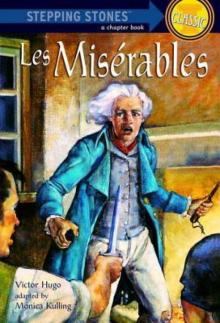 Les Miserables
Les Miserables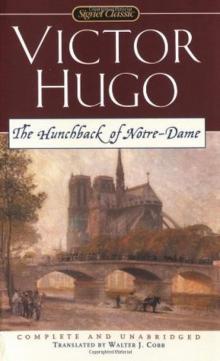 The Hunchback of Notre-Dame
The Hunchback of Notre-Dame The Man Who Laughs
The Man Who Laughs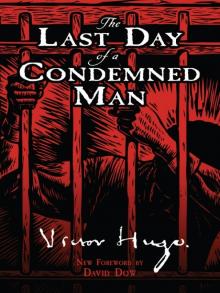 The Last Day of a Condemned Man
The Last Day of a Condemned Man The Toilers of the Sea
The Toilers of the Sea Waterloo
Waterloo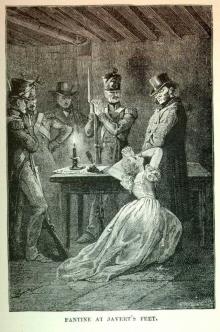 Les Misérables, v. 1/5: Fantine
Les Misérables, v. 1/5: Fantine Les Misérables, v. 3/5: Marius
Les Misérables, v. 3/5: Marius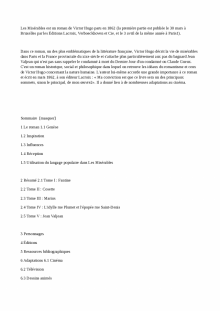 Les Misérables, v. 2/5: Cosette
Les Misérables, v. 2/5: Cosette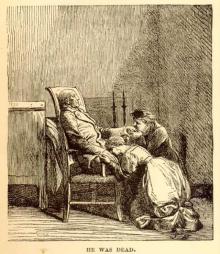 Les Misérables, v. 5/5: Jean Valjean
Les Misérables, v. 5/5: Jean Valjean Hunchback of Notre Dame (Barnes & Noble Classics Series)
Hunchback of Notre Dame (Barnes & Noble Classics Series) Les Miserables (abridged) (Barnes & Noble Classics Series)
Les Miserables (abridged) (Barnes & Noble Classics Series)